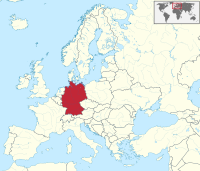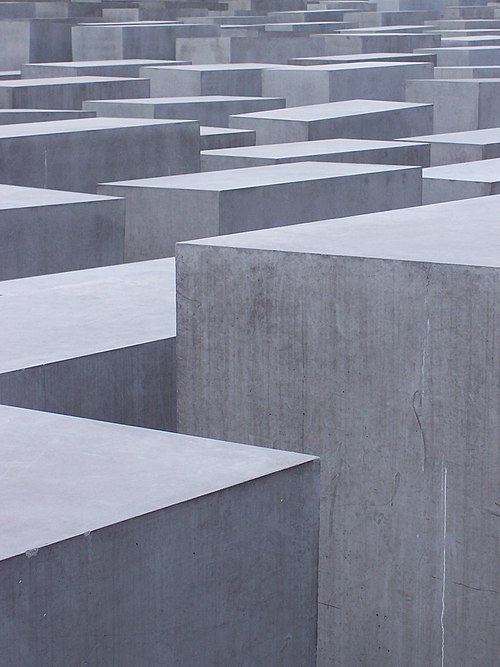Portal:Germany
Welcome to the Germany Portal!
Willkommen im Deutschland-Portal!

|

|

| |
Germany (German: Deutschland), officially the Federal Republic of Germany, is a country in Central and Western Europe, lying between the Baltic and North Seas to the north and the Alps to the south. It borders Denmark to the north, Poland and the Czech Republic to the east, Austria and Switzerland to the south, France to the southwest, and Luxembourg, Belgium and the Netherlands to the west.
Germany includes 16 constituent states, covers an area of 357,578 square kilometres (138,062 sq mi) and has a largely temperate seasonal climate. With 83 million inhabitants, it is the second most populous state of Europe after Russia, the most populous state lying entirely in Europe, as well as the most populous member state of the European Union. Germany is a very decentralized country. Its capital and largest metropolis is Berlin, while Frankfurt serves as its financial capital and has the country's busiest airport.
In 1871, Germany became a nation-state when most of the German states unified into the Prussian-dominated German Empire. After World War I and the Revolution of 1918–19, the empire was replaced by the parliamentary Weimar Republic. The Nazi seizure of power in 1933 led to World War II, and the Holocaust. After the end of World War II in Europe and a period of Allied occupation, two new German states were founded: West Germany, formed from the American, British, and French occupation zones, and East Germany, formed from the western part of the Soviet occupation zone, reduced by the newly established Oder-Neisse line. Following the Revolutions of 1989 that ended communist rule in Central and Eastern Europe, the country was reunified on 3 October 1990.
Today, Germany is a federal parliamentary republic led by a chancellor. It is a great power with a strong economy. The Federal Republic of Germany was a founding member of the European Economic Community in 1957 and the European Union in 1993. Read more...
Selected article

Albert Einstein (March 14, 1879 – April 18, 1955) was a theoretical physicist widely regarded as the most important scientist of the 20th century. He developed the special and general theories of relativity and made significant contributions to quantum mechanics, statistical mechanics, and cosmology. He was awarded the 1921 Nobel Prize for Physics for his explanation of the photoelectric effect in 1905 (his "wonderful year") and "for his services to Theoretical Physics".
After British solar eclipse expeditions in 1919 confirmed that light rays from distant stars were deflected by the gravity of the Sun in the amount he had predicted in his theory of relativity, Einstein became world-famous, an unusual achievement for a scientist. In his later years, his fame perhaps exceeded that of any other scientist in history. In popular culture, his name has become synonymous with great intelligence and genius. More...
Selected picture
Related portals
- Parent portals
- Regional
- History
 Holy Roman Empire (900–1806)
Holy Roman Empire (900–1806) East Germany (1949–1990)
East Germany (1949–1990)
- Neighbouring countries
Anniversaries for May 17

- 1587 – Death of Gotthard Kettler, last master of the Livonian Order
- 1706 – Birth of historian Andreas Felix von Oefele
- 1821 – Birth of naturopathist Sebastian Kneipp
- 1946 – Birth of musician Udo Lindenberg
Did you know...
- ... that Oksana Lyniv founded the Youth Symphony Orchestra of Ukraine in 2016 and conducted them in thirty concerts across ten music festivals in 2022?
- ... that ancient humans cared for a 14,000-year-old puppy?
- ... that a reviewer described the approach of soprano Magdalena Hinterdobler to her role as Grete in Zemlinsky's Der Traumgörge as "bold" and "sassy"?
- ... that Thomas Mann insisted on omitting a passage on homoeroticism in the English translation of his work "On the German Republic"?
- ... that Heike Heubach became the first deaf member of the German Bundestag?
- ... that in opposition to his parents, opera star Joseph Schwarz began his career by running away from home to join a band of traveling minstrels?
- ... that Robert Winterberg's 1911 operetta Die Dame in Rot was adapted into English for Broadway?
- ... that in 1933 Nazi sympathisers attempted to kidnap two German-Jewish filmmakers in Liechtenstein?
Selected cuisines, dishes and foods

German wine is primarily produced in the west of Germany, along the river Rhine and its tributaries, with the oldest plantations going back to the Roman era. Approximately 60 percent of German wine is produced in the state of Rhineland-Palatinate, where 6 of the 13 regions (Anbaugebiete) for quality wine are situated. Germany has about 103,000 hectares (252,000 acres or 1,030 square kilometers) of vineyard, which is around one tenth of the vineyard surface in Spain, France or Italy. The total wine production is usually around 10 million hectoliters annually, corresponding to 1.3 billion bottles, which places Germany as the eighth-largest wine-producing country in the world. White wine accounts for almost two thirds of the total production.
As a wine country, Germany has a mixed reputation internationally, with some consumers on the export markets associating Germany with the world's most elegant and aromatically pure white wines while other see the country mainly as the source of cheap, mass-market semi-sweet wines such as Liebfraumilch. Among enthusiasts, Germany's reputation is primarily based on wines made from the Riesling grape variety, which at its best is used for aromatic, fruity and elegant white wines that range from very crisp and dry to well-balanced, sweet and of enormous aromatic concentration. While primarily a white wine country, red wine production surged in the 1990s and early 2000s, primarily fuelled by domestic demand, and the proportion of the German vineyards devoted to the cultivation of dark-skinned grape varieties has now stabilized at slightly more than a third of the total surface. For the red wines, Spätburgunder, the domestic name for Pinot noir, is in the lead. (Full article...)Topics
Categories
Things you can do

A list of articles needing cleanup associated with this project is available. See also the tool's wiki page and the index of WikiProjects.
Here are some tasks you can do. Please remove completed tasks from the list.
- Requests: Columbiahalle, German Archaeological Institute at Rome, Deutsche Familienversicherung, Dietlof von Arnim-Boitzenburg, Hennes Bender, Georg Bernhard (1875–1944), Eduard Georg von Bethusy-Huc, Rolf Brandt (1886–1953), Jan Philipp Burgard, Georg Arbogast von und zu Franckenstein, Ferdinand Heribert von Galen, Herbert Helmrich, Monty Jacobs (1875–1945), Hans Katzer, Siegfried Kauder, Heide Keller, Matze Knop, Isidor Levy (1852–1929), Markus Löning, Anke Plättner, Hans Heinrich X. Fürst von Pless, Gerd Poppe, Victor-Emanuel Preusker, Hans Sauer (inventor), Franz August Schenk von Stauffenberg, Paul Schlesinger (1878-1928),Oscar Schneider, Hajo Schumacher, Otto Theodor von Seydewitz, Dorothea Siems, Werner Sonne, Anton Stark, Udo zu Stolberg-Wernigerode, Christoph Strässer, Torsten Sträter, Joseph von Utzschneider, Jürgen Wieshoff, Hans Wilhelmi,
- Unreferenced: Unreferenced BLPs, Bundesautobahn 93, Benjamin Trinks, Steeler (German band), Amelie Beese, Zoologisches Museum in Kiel, Emil Krebs, Prussian semaphore system, Partenstein, Peter Krieg, Porsche 597, Christa Bauch, Curt Cress, Stefan Beuse
- Cleanup: 53541 issues in total as of 2024-03-03
- Translate: Articles needing translation from German Wikipedia
- Stubs: Albersdorf, Thuringia, Ingo Friedrich, Berndt Seite, Federal Social Court; 107 articles in Category:German MEP stubs
- Update: Deutsches Wörterbuch
- Portal maintenance: Update News, Did you know, announcements and the todo list
- Orphans:
Orphaned articles in Germany

- Photo: Take/Add requested photographs
- Expression error: Unrecognized punctuation character ",".
Associated Wikimedia
The following Wikimedia Foundation sister projects provide more on this subject:
-
Commons
Free media repository -
Wikibooks
Free textbooks and manuals -
Wikidata
Free knowledge base -
Wikinews
Free-content news -
Wikiquote
Collection of quotations -
Wikisource
Free-content library -
Wikiversity
Free learning tools -
Wikivoyage
Free travel guide -
Wiktionary
Dictionary and thesaurus














































